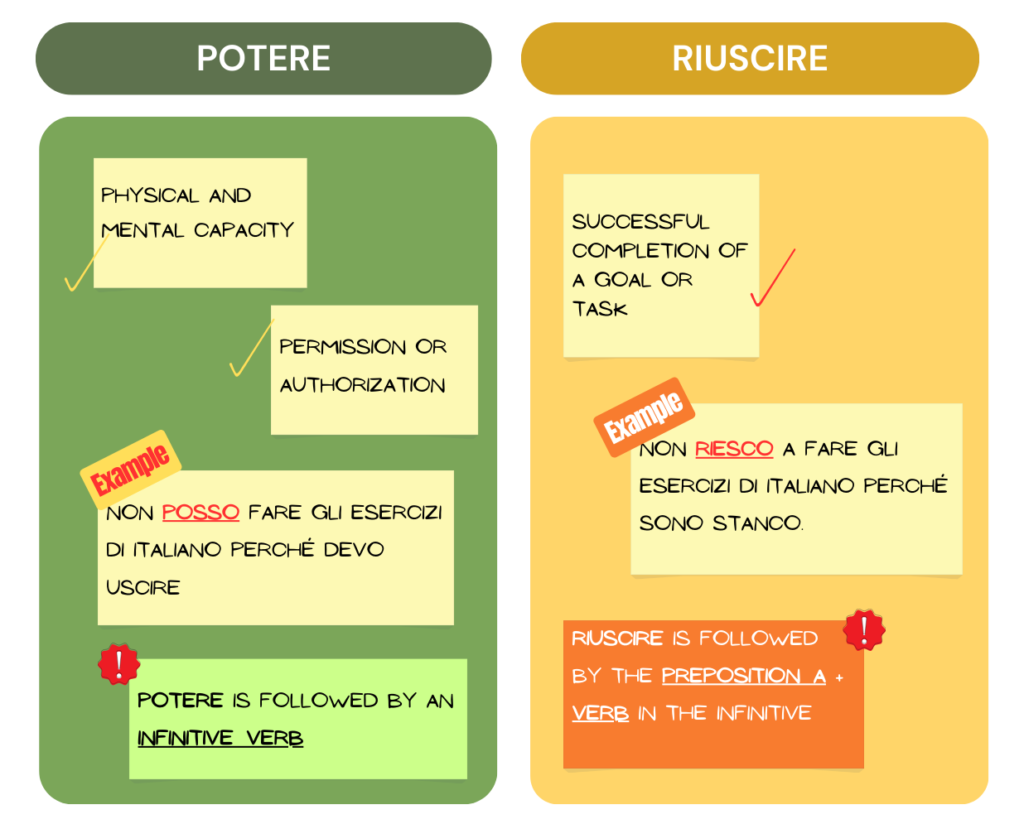This comprehensive guide will help you understand the hidden meanings of these 2 Italian verbs. If you’ve ever been confused by the use of “Potere” and “Riuscire” in Italian, you are not alone.
POTERE and RIUSCIRE are two Italian verbs that indicate the ability or potential to achieve something. While they have a similar meaning, they are used in slightly different ways.

POTERE is most usually used to describe physical and mental capacity or power, such as lifting a large object or running a long distance. It can also be used to indicate permission or authorization, such as the ability to enter a building or park a car in a specific location.
In contrast, RIUSCIRE is typically used to signify the successful completion of a goal or task, often after a significant effort or hardship.
Overall, both verbs are useful in expressing the ability or possibility to accomplish something, but the context and desired emphasis should be considered when choosing which one to use.
Let’s gain a better understanding of the differences.
Non posso fare gli esercizi di italiano perché devo uscire (I can’t do the Italian exercises because I have to go out)
Non riesco a fare gli esercizi di italiano perché sono stanco. (I can’t do the Italian exercises because I’m tired.)
Posso fare tutti gli esercizi di italiano perché ho tempo (I can do all the Italian exercises because I have time)
Riesco a fare tutti gli esercizi di italiano perché ho studiato. (I can do all the Italian exercises because I studied.)
Potere and Riscire can occasionally be used interchangeably.
Non ho potuto studiare perché c’era troppo rumore (I couldn’t study because there was too much noise)
Non sono riuscito a studiare perché c’era troppo rumore. (I couldn’t study because there was too much noise.)

POTERE is followed by an infinitive verb
RIUSCIRE is followed by the preposition a + verb in the infinitive

What’s next?
You might want to keep learning Italian online with these free resources:









Jeffrey Lamb
Hi, could you please explain why in the above example where you write ‘ Riesco a fare tutti gli esercizi di italiano perché ho studiato.’ why you use ‘tutti’ and not ‘tutto’. I was under the impression that ‘tutti’ referred only to persons?
Many thanks.
Jeff
easitalian
Hi Jeff,
I’d be happy to explain! In Italian, “tutti” and “tutto” have different uses and meanings.
“Tutti” means “all” or “everyone” and is used for plural nouns. It can refer to people, things, or activities.
“Tutto” means “everything” or “all” and is used for singular nouns or the whole of something.
In the sentence “Riesco a fare tutti gli esercizi di italiano perché ho studiato,” “esercizi” is a plural noun (meaning “exercises”). Therefore, “tutti” is the correct form to use because it matches the plural noun “esercizi.” If “exercise” were singular, you would use “tutto.”
So, “tutti” is used here because it refers to all the exercises, not just a singular exercise.
Hope this clears it up!
If you need further explanations examples and practice, please visit the page: https://www.easitalian.com/how-to-use-molto-tanto-troppo-poco-tutto-ogni-qualche/#tutto
Also if you still need help feel free to contact me.